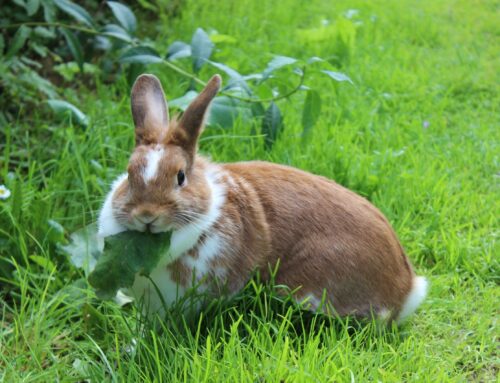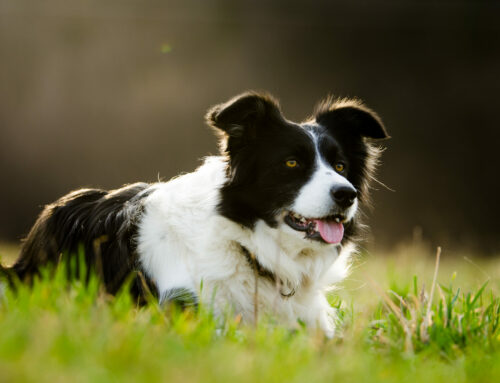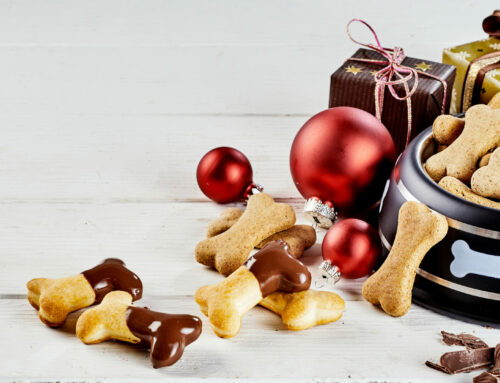It might come as a surprise that Christmas can be a risky business for your pets, but when you think about it (which we vets of course do), there are numerous activities and items associated with the festive period that could spell disaster for our pets and, in turn, ruin the festive feeling for everyone if a pet becomes unwell. We don’t mean to spoil the Christmas spirit, on the contrary, we want to help you and your pets share a wonderful Christmas together, happy and healthy. So here’s our guide to some Christmas pet risks and how to avoid them.
Chocolate and sweet treats
We humans should think ourselves lucky to be able to digest and metabolise the components of chocolate, we get to enjoy some delicious treats as a result. Dogs and cats are less fortunate in this way. The component ‘theobromine’ is a toxin to cats and dogs and causes vomiting, diarrhoea, tremors, seizuring and can even be fatal for our furry companions. In addition, many “low calorie” sweet treats these days contain another potentially deadly ingredient called xylitol. Even small amounts of this sweetener can be life-threatening; what better excuse then, to enjoy all the festive treats ourselves this year? Keep chocolate, treats, all human food in fact, out of reach of pets.
Christmas decorations
We choose the most vibrant and attractive decorations to adorn our Christmas trees and houses with at this time of year. But guess who else might take a great interest in them? Christmas decorations aren’t generally pet-friendly; baubles and small tree decorations can be a choking hazard, Christmas lights an electrocution risk, and plants such as poinsettia, holly and mistletoe can cause upset stomachs for cats and dogs. Tinsel can also be a hazard (yes even tinsel!), as it is shiny and can be pulled from the Christmas tree, making it a great game for exuberant pets. Cats especially enjoy playing with string-like items; but if ingested, tinsel could mean a trip to the vets and even a surgical procedure. So if your cat or dog can’t be 100% trusted around these things, please keep them out of reach so as not to make an unplanned trip to see us over the holidays this year.
Will it be a boozy Christmas?
Many people like to enjoy a relaxing alcoholic drink at Christmas; often there is more booze around than usual. Alcohol can be attractive to pets, especially when it is sweetened with fruit or sweet additives. Alcohol is highly toxic to pets, causing vomiting, lethargy, incoordination, weakness and collapse. And what follows a boozy night? Often pain-killing medications for a bad head. It is easy to leave these lying around when one crawls back into bed to nurse a sore head, but human medications can have devastating effects for our pets, so please make sure they make it back to the medicine cupboard once used.
Christmas dindins
Lavish dinners at Christmas time are a must. For people that is! Please take care if you plan to include your pets in this festive activity as there is much to go wrong. Onions, garlic and chives are all toxins for cats and dogs, all of which are often amalgamated into a good Christmas feast. Brussel sprouts, carrots and bone-free, cooked meat are all okay for a little treat. Ensure they are given in moderation however, to avoid upset stomachs. And beware the perils of high-fat foods (such as turkey skin and fat trimmings) in cats and dogs, which can cause acute pancreatitis. Pancreatitis is generally highly painful for pets, making them very poorly and can incur long pet-hospital stays.
Christmas fruits
Raisins and grapes are out in force in December, with mince pies, Christmas cake and cheese boards, they are hard to avoid. But cats and dogs must avoid eating them as they can cause acute and severe kidney disease. Even small amounts can be a problem, so please make sure these items are out of reach of roaming noses and avoid an emergency trip to the vets.
What do you do if your pet eats something they shouldn’t?
Step one is phone for help. Even if you’re unsure whether the substance is a problem, phone advice is free and making the phone call immediately could save your pet’s life. Try to gather information on what they have eaten. For example, if it is chocolate, how much did they eat and what percentage cocoa solids was it? Don’t let this step delay your phone call or your journey to the vets if they suggest you should be seen immediately.



